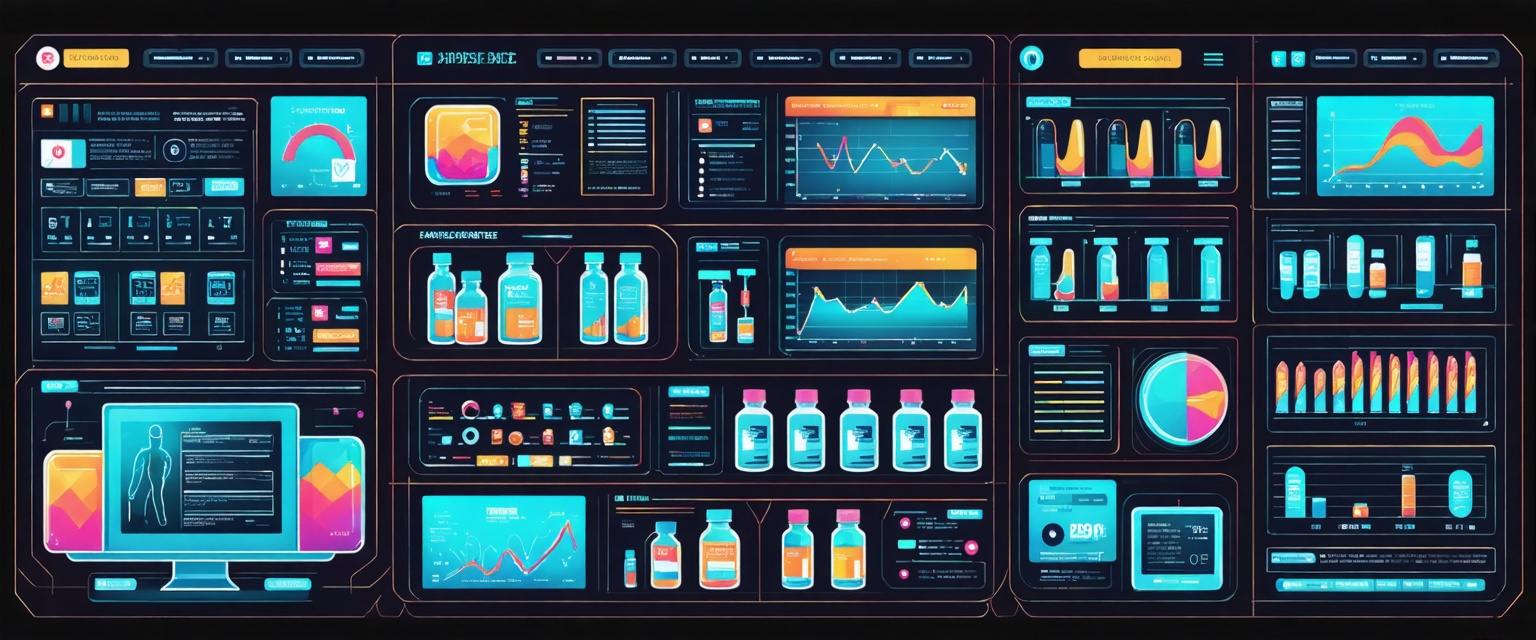Discover how AI agents revolutionize inventory management for clinical managers, enhancing operational efficiency, ensuring safety, and cutting costs.
Clinical managers lose valuable time tracking supplies manually, risking stockouts, expired meds, and avoidable disruptions to care.
Outdated systems make it hard to keep up. But thanks to advances in Agentic AI, it’s now easier than ever to automate inventory checks, restocking, and expiration tracking.
Datagrid’s data connectors link up with existing systems to streamline this process and reduce human error. This article breaks down how AI agents are transforming inventory management behind the scenes.
What is Inventory Management for Clinical Managers?
Inventory management in clinical settings goes far beyond standard warehouse logistics. It involves orchestrating the continuous flow of medical supplies, pharmaceuticals, surgical tools, and equipment in environments where shortages or errors can directly impact patient outcomes.
Clinical managers must simultaneously balance:
- Tracking usage across multiple departments and facilities
- Maintaining precise stock levels for thousands of items
- Coordinating timely reorders with procurement departments
- Ensuring compliance with strict healthcare regulations
- Managing high-value and specialized medical equipment
This complex balancing act creates unique operational challenges unlike those in retail or manufacturing environments. To address these challenges, many clinical managers are turning to AI agents in clinical management to streamline operations and ensure compliance with regulations.
Key Inventory Management Tasks for Clinical Managers
Behind the scenes, clinical managers handle an impressive array of responsibilities:
- Stock tracking with AI agents: Monitoring thousands of individual SKUs across multiple departments and locations, from syringes and PPE to specialized surgical equipment.
- Expiry date management: Tracking expiration dates for medications and sterile supplies to prevent waste and ensure patient safety.
- Regulatory documentation: Maintaining detailed logs for controlled substances, implantable devices, and other regulated items.
- Order management: Coordinating routine orders, emergency stock replenishment, and special orders across various suppliers and manufacturers.
- Cross-team coordination: Serving as the communication hub between clinical staff, procurement teams, finance departments, and vendors.
Why Inventory Management is Critical for Clinical Managers
Poor inventory management isn't just an administrative headache, it's a triple threat:
- Patient safety: When you can't find what you need when you need it, patient care suffers.
- Financial control: Healthcare facilities spend 25-30% of their budget on supplies. Expired products, rush shipping fees, and overstocking drain resources from more important needs.
- Operational efficiency: Every minute staff spends hunting for supplies is a minute they're not caring for patients.
Unique Inventory Challenges in Healthcare
Healthcare inventory isn't just complicated, it's in a category of its own:
- Diversity of items: A typical hospital juggles between 4,000-6,000 different inventory items, from simple gauze to complex implantable devices.
- Temperature-sensitive items: Many medications require precise temperature control throughout their journey.
- Usage variability: Patient needs fluctuate wildly and often without warning, making precise forecasting nearly impossible through traditional methods.
- Regulatory requirements: Healthcare regulations demand meticulous tracking, especially for implantable devices and controlled substances.
- Multiple storage locations: Supplies scatter across numerous departments, floors, and facilities, creating tracking nightmares.
Bottlenecks in Manual Inventory Management for Clinicians
The old ways of tracking medical inventory aren't just inefficient, they're actively dangerous for the healthcare system.
Manual Data Entry and Tracking
The reality in most clinical settings looks something like this:
- Spreadsheet dependency: Nurses update Excel files after exhausting shifts, creating dangerous lags between use and documentation.
- Transcription errors: Human counting means human errors; a box of 50 syringes might become 15 or 500 in the system, throwing off everything downstream.
- Limited visibility: Without real-time data, you often discover critical shortages when grabbing the last item.
- Double documentation: Staff record the same information multiple times, on paper, in electronic records, and again in ordering systems.
Reactive Stock Replenishment and Emergency Orders
Without prediction capabilities, you're stuck constantly putting out fires:
- Crisis ordering: When items run out unexpectedly, you pay premium prices and rush shipping fees 2-3 times higher than standard deliveries.
- Staffing disruptions: Supply gaps force staff away from patient care to hunt through other departments for critical items.
- Vendor relationship strain: Constant emergency orders frustrate vendors and kill your negotiating power.
Locating and Auditing Inventory Across Multiple Sites
The physical aspects create even more headaches:
- Hidden hoarding: Trust issues lead departments to create secret stashes of critical items, skewing your ordering data.
- Labor-intensive audits: Physical counts steal staff time and often require overtime or weekend work.
- Cross-location reconciliation: Multi-facility systems face the additional puzzle of syncing inventory across locations.
Implementing AI technologies in inventory management can help mitigate these challenges by providing better visibility and more efficient tracking across all sites.
Compliance and Expiry Management
Manual monitoring creates compliance nightmares:
- Missed expiration dates: Without automated tracking, expired items lurk in storage until discovered during use, sometimes too late.
- Compliance documentation gaps: Manual logging of lot numbers during busy periods creates holes in your regulatory records.
- Recall management challenges: When recalls happen, finding and removing affected items becomes a frantic scavenger hunt.
- Audit preparation burdens: Getting ready for regulatory inspections can consume days of staff time.
How AI Agents Automate Inventory Management for Clinical Managers
AI agents do much more than count supplies; they actively monitor, analyze, and take action to keep your supply chain running smoothly.
Real-Time Inventory Monitoring and Data Integration with AI Agents
AI creates a live, accurate picture of your inventory:
- RFID, barcode scanning, and smart shelf technologies update inventory counts in real-time
- Machine vision systems count supplies without human intervention
- Integration with clinical systems tracks supply usage during procedures
For example, AI-powered computer vision systems can monitor supply closet inventory levels and automatically update quantities when items are removed, eliminating counting altogether.
Predictive Demand Forecasting and Automated Reordering
AI spots patterns humans miss:
- Historical usage combined with scheduled procedures enables precise forecasting
- Seasonal trend analysis adjusts inventory before demand spikes
- Automated reordering based on predefined thresholds and delivery timelines
By utilizing AI agents for accurate demand forecasting, clinical managers can enhance their demand forecasting and ensure the right inventory levels are maintained.
Automating Expiry and Compliance with AI Agents
AI never forgets an expiration date.
With AI, you have:
- Automated tracking for all inventory items
- Proactive alerts for soon-to-expire items
- Digital logging of regulatory information
- Instant identification of recalled items
This automation cuts waste from expired products while keeping you compliant with healthcare regulations.
Workflow Integration and Task Delegation with AI Agents
Rather than creating another isolated system, AI works across your existing platforms:
- Integration with EHR systems tracks supply usage during patient care
- Automated communication with procurement systems initiates orders
- Task assignment to appropriate staff for physical inventory actions
- Alert prioritization based on clinical impact and urgency
This coordination ensures inventory information flows throughout your organization, eliminating duplicate work.
Continuous Learning and Process Optimization through AI Agents
AI gets smarter over time:
- Learning from previous stockouts to adjust safety stock levels
- Identifying supplier performance patterns to optimize lead times
- Recognizing department-specific usage patterns for accurate forecasting
- Adapting to seasonal variations and unexpected demand shifts
By leveraging AI to optimize information gathering, clinical managers can ensure that their systems are continuously improving and adapting to new challenges.
Your inventory management becomes increasingly efficient as the AI learns your facility's unique patterns.
Datagrid for Healthcare Professionals
Healthcare professionals face overwhelming data challenges while trying to keep patients first. Datagrid's AI-powered platform turns these challenges into opportunities for better care.
Streamlined Documentation and Record Management
Datagrid processes thousands of patient records simultaneously, extracting critical information and organizing it for quick retrieval. This means less paperwork and more patient time.
Accelerated Insurance Claims Processing
For insurance claims, Datagrid's AI agents validate coding, find documentation gaps, and speed up reimbursement.
Evidence-Based Clinical Decision Support
Treatment decisions improve with Datagrid comparing cases against evidence-based protocols. The platform identifies optimal care pathways by analyzing outcomes across similar patients, giving you valuable decision support.
Proactive Medication Management
Medication management becomes proactive with Datagrid monitoring prescription patterns and potential interactions. The system flags high-risk situations before they become problems, protecting patients.
Automated Regulatory Compliance
Regulatory compliance gets easier with Datagrid continuously auditing documentation practices. AI agents spot compliance risks before they become issues, safeguarding your organization.
Population Health Analytics
Datagrid analyzes demographic data, outcomes, and social determinants across your patient base. This enables targeted preventive care and community health improvements through data-driven insights.
Research and Clinical Trial Support
For research initiatives, Datagrid accelerates progress by extracting relevant data from medical literature, clinical trials, and patient databases. This helps identify potential research participants and outcome patterns efficiently.
Clinical Workflow Optimization
By using Datagrid, your clinical team can focus on patients instead of paperwork. The platform handles data-intensive tasks that typically consume valuable clinical hours.
Simplify Healthcare Tasks with Datagrid's Agentic AI
Don't let data complexity slow down your team. Datagrid's AI-powered platform is designed specifically for teams who want to:
- Automate tedious data tasks
- Reduce manual processing time
- Gain actionable insights instantly
- Improve team productivity
See how Datagrid can help you increase process efficiency.













